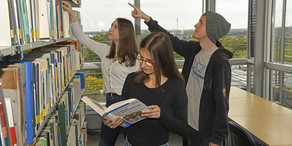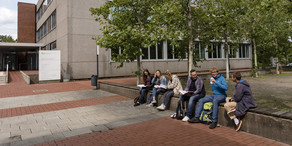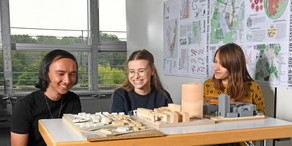Millennium Express - Planning for Disaster Prone Areas
- SPRING

Locally organized by the SPRING Batch 2010/11 and funded by the DAAD, the two day seminar workshop involved a plenary and parallel discussion supplemented with exhibition highlighting the faces of disaster. Apart from strengthening the networking of the DAAD scholars and alumni, the event was first and foremost conducted to address issues pertaining to modern ways on how to deal with disaster focusing on preparation, mitigation, recovery and rehabilitation. The participants included pre-selected DAAD scholars, PHD students from the Spatial Faculty of TU Dortmund, Representatives from the University and Ms. Anke Stahl, Head of DAAD Section 431, who also participated in the fruitful event.The first day of the event started with a special presentation from the SPRING students performing a rhetorical speech focusing on the reflections of the faces/voices behind every disaster. Having laid the tone of the event, the event proper started with a keynote speech on Planning for Disaster Prone Areas delivered by Karl-Otto Zentel, CEO German Committee on Disaster Reduction (DKKV). The keynote speech was followed by a series of lectures divided into two themes: Proactive Planning including Governance, Institutional Arrangements, Disaster Resistant Infrastructure and Disaster Management on Rebuilding, Rehabilitation and Reintegration. The first theme was tackled by a local expert from TU Dortmund from the Institute of Spatial Planning (IRPUD) Dr. Mark Fleischauer. He talked about Spatial Planning and Risk Governance: Potentials and Limitations of Spatial Planning in Multi-risk Management of Urban Areas. The second theme was tackled by three International Public Health Specialists namely Dr. Felix Diesner from Bogota Columbia (Climate Change, A New Challenge for Disaster Management and Security), Nasir Umar from the Faculty of Mannheim, Heidelberg University (On Individual/Societal Preferences in Disaster Management) and Shafiu Mohammed, from the Medical Faculty of Heidelberg University (Public Health Impact of Disasters: Equity, Accountability and Role of Media). A panel discussion was held after all the presentations were made.
The second day brings to focus to the actual experiences of Haiti, as a rejoinder to the theoretical background of the first day. Spearheading the discussion were two alumni of SPRING, Johannes Horstman, who works for the Environmental Planning for Development in Haiti and Yegana Guliyeva, Head of Emergency Response, Haiti/Carribean Regional Office of Lutheran World Federation. They talked about the measures for the rehabilitation of Haiti after the disaster from the planners’ and the NGO perspective.
To cap the event, closing remarks were given by Dr. Anne Weber, SPRING Manager and a message from the SPRING Class was delivered by SPRING 2010/11 representative, Lineka Bwile. Their message captured the essence of the whole seminar to bring across the role each and everyone plays in planning for the unexpected.
After the closing ceremony, the participants were treated to a city tour in Dortmund which lasted for two and a half hours.












